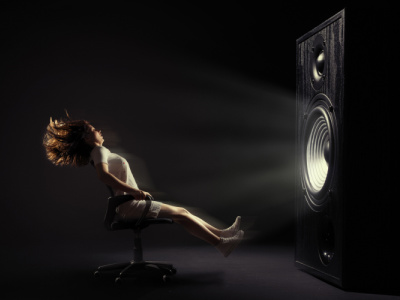The late, great Ray Charles is credited with having said that “music is powerful. As people listen to it, they can be affected.” Apparently, the U.S. 9th Circuit Court of Appeals (whose rulings apply to all Nevada employees) agrees with the Genius from Georgia, at least when it comes to music businesses allow to be played in the workplace.
Facts
Wholesale clothing manufacturer S&S Activewear allowed employees and managers to play offensive music throughout its 700,000-square-foot warehouse in Reno, Nevada. The songs included lyrics that were offensive to both women and men.
Despite almost daily complaints, S&S permitted the music to play from commercial-strength speakers throughout the warehouse for almost two years until former employees, led by Stephanie Sharp, filed suit.
Court Finds Harassment
The case made its way to the 9th Circuit, which held that “sexually graphic, violently misogynistic music [is a] form of harassment that can pollute a workplace and give rise to a . . . claim” under Title VII of the Civil Rights Act of 1964 for sex discrimination—the federal statute prohibiting workplace discrimination based on protected classifications such as race and sex.
This was the first time the court ruled on this issue.
The court reasoned that regardless of whether the music was targeted at a particular individual and whether the challenged conduct was offensive to multiple genders, a claim could result. Failure to heed the daily complaints meant that “Sharp was forced to tolerate the music and the toxic environment as a condition of continued employment.”
The court also refused to acknowledge the often asserted, rarely successful defense that the employees who played the offensive music were “equal opportunity harassers.”
Interestingly, the court didn’t stop at music being broadcast through technology and noted that “whether sung, shouted, or whispered, blasted over speakers or relayed face-to-face, sexist epithets can offend and may transform a workplace into a hostile environment that violates Title VII.” Sharp v. S&S Activewear, LLC, No. 21-17138 (9th Cir., June 7, 2023).
What It Means for Nevada Employers
Although the Sharp court analyzed the issues under federal law, because Nevada courts frequently look to federal law to interpret Nevada’s antidiscrimination statute, the Sharp holding could signal potential liability under both federal and Nevada state law.
Indeed, because Nevada’s state antidiscrimination laws use the same legal standards the Sharp court used—namely, assessing whether the employee was subjected to severe or pervasive conduct, based on a protected classification such as sex, that’s offensive to both the employee and a reasonable person—Nevada businesses that fail to control the type of music being played could become defendants in both state and federal court.
Takeaways
To minimize the likelihood of liability, however, there are several steps Nevada businesses can take:
Update your policies. Many businesses have written policies that not only prohibit sexual harassment but also give details of the types of conduct that constitute such harassment. Now that the 9th Circuit has issued a new rule, you should consider updating your policies to clarify that the type of music played in the workplace can violate company policy.
Consider the source: radio edits vs. unfiltered lyrics. The Sharp decision makes it clear that widespread broadcasting of music, to the point where employees can’t avoid hearing it, comes with risk. If you choose to broadcast music through loudspeakers or similar technology, you should carefully examine its content to ensure the lyrics are appropriate.
To that end, broadcasting radio programs (which, by definition, typically play only censored versions) may be preferable to the unfiltered lyrics that can be found via Internet streaming services or an employee’s private music collection.
Even with edited radio versions, however, you should review proposed workplace tunes carefully to ensure they don’t contain:
- References to women as “bitches” (or other offensive comments about sex and gender);
- Racial slurs or other racially insensitive language;
- Insensitive language targeting the disabled; or
- Any other language based on classifications Nevada law protects (i.e., race, color, religion, sex, sexual orientation, gender identity or expression, age, disability, or national origin).
Consider headphones or other limiting measures. A key factor in the Sharp decision was that the employees at issue were “forced to tolerate the music and the toxic environment as a condition of continued employment.” This can be avoided by requiring employees to listen to music through headphones (where safe and appropriate) and/or by limiting the playing of music to enclosed spaces (such as individuals’ offices) rather than widespread communal areas employees can’t avoid.
Don’t ignore complaints. While lyricists such as Cardi B may not appeal to all employees, companies shouldn’t assume an employee’s complaints about the music represent artistic preferences only. Instead, when employees complain about music, you should assess whether the complaints involve allegations of offensive lyrics. If they do, it may be easier to simply prohibit such music from being played.
When in doubt, consult with counsel. Because each workplace (and each workplace complaint) is unique, you should consult with employment counsel to determine whether additional preventive measures may be appropriate to avoid music-related harassment claims.
Shannon S. Pierce and Geenamarie Carucci Vance are attorneys with Fennemore Law in Reno, Nevada. You can reach them at spierce@fennemorelaw.com and gcarucci@fennemorelaw.com.

